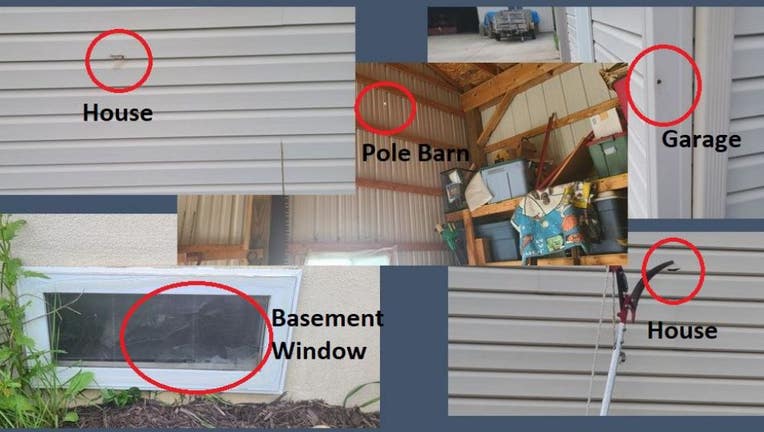Target shooting near Port Huron banned due to homes and trees being riddled with bullets

Property damage near a targeted shooting area in Port Huron. Photo via DNR presentation.
ST. CLAIR COUNTY, Mich. (FOX 2) - Target shooting activity at a state game area in St. Clair County will be shut down following repeated issues of structures being shot, noise complaints, and lead bullets polluting the surrounding wetlands and nearby habitats.
An order expected to be signed by the director of the Natural Resources Commission (NRC) will prohibit target shooting at the Port Huron State Game Area, which is 20 minutes west of Port Huron and an hour north of Detroit.
The area, which spans over 7,000 acres, is a popular spot for people to practice shooting at targets. However, it's also become a source of persistent problems with neighbors who have complained about property damage, habitat destruction, and public safety concerns.
The area includes Grant, Clyde, and Kimball townships. One shooting site called Shoefelt Road was closed in 1989 because gun owners were firing automatic and semi-automatic rifles indiscriminately.
The area's closure directed target shooters to three additional sites at Flinchbaugh Road, Hewitt Pit, and Abbottsford Road. However, complaints continued to roll in from residents that live in nearby neighborhoods.
According to a Department of Natural Resources memo sent to the NRC, there were close to a dozen different examples of target shooting becoming a public and environmental hazard. Among them is a case of gun users "shooting in the air, at trees, over berms, and at signs that say, ‘Unsafe shooting direction’."
MORE: Wild cougar in Michigan's U.P. caught on trail camera hunting deer, dragging carcass away
Here are other examples:
- Houses and outbuildings, such as garages and pole barns, have been hit by bullets
- Bullets are traveling to an adjacent golf course
- Trees have been hit by bullets
- Noise complaints, such as shooting after legal target shooting hours and the illegal use of explosives, such as Tannerite
- Excessive amounts of litter left behind in places where target shooting activities occur
- Target shooting locations have wetlands and are along the Black River, resulting in lead shot and projectiles being deposited in the river and in sensitive habitats
- Some areas used for target shooting consists of land that is flat which can allow bullets to travel further than the shooter may expect, however even areas with suitable backstops like Hewitt Pit are experiencing bullets traveling in dangerous directions due to target shooters disregarding signage and shooting in those unsafe directions
- High-quality forests and shrubby openings provide habitat for a wide variety of species, which results in opportunities for wildlife-based recreation. The result of high target shooting use makes it unsafe for habitat work, hunting, or other wildlife-based recreation
- Target shooting has the potential to negatively affect wildlife-based recreation by creating unsafe areas for the public to hunt due to lack of backstops and the hazing wildlife on public lands
- Target shooting has resulted in large areas where DNR staff cannot safely conduct habitat management
The DNR tried assuaging concerns by posting signs near neighborhoods that told gun owners where to and not to shoot and aim their firearms. There were also trash clean-ups and additional signage that was posted.
Even with the efforts, complaints continued coming in, leading to the DNR's recommendation that the SGA be closed to target shooting.
Terry McFadden, a field operations manager for the DNR's southeast region, said if gun owners still want to practice, they can visit the Lapeer Pit Shooting Range, which is only 40 minutes away. The range is open seasonally from May 1 to Sept. 30 on Thursdays, Fridays, and Saturdays from 11 a.m. to 7 p.m., and Oct. 1t o Dec. 15 from 9 a.m. to 5 p.m..
It's closed for the season between Dec. 16 and April 30.


